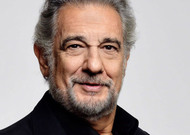 © DR
© DR
In 1993, just twenty years ago, Plácido Domingo sponsored the first edition of the Operalia competition (then presented as “the Olympic Games of Opera”) with a mighty ambition: first, to demonstrate that “opera is a living art that will never die” by focusing on “young performers of all stripes” and, then, to discover this new generation of young lyric talents (voice as well as stage and theatrical interpretations) to better contribute to boosting their careers – the reason that the competition’s jury is composed of veteran performers sharing their professional experience, but also set designers and artistic directors who, in the years to come, will hire the participants who most distinguish themselves during the competition.
And for more than twenty years, Operalia has manifestly achieved its goal, as the competition has awarded dozens of performers, like Nina Stemme and Inva Mulla at the first edition in 1993, or later Rolando Villazón and Sonya Yoncheva, Joyce Di Donato, or more recently Pretty Yende in 2011.
The 2015 edition, held this year at the London Royal Opera House, will bring together some forty quarter-finals candidates starting on 13 July (some of them are already showing signs of a promising career, with more than a thousand candidates each year coming from some twenty countries) before they are gradually eliminated until the evening of the finale, Sunday 19 July.
See also : the very first auditions of Operalia in 1993, with Nina Stemme, Inva Mulla, Ainhoa Arteta and Kwangchul Youn.
Operalia 2015 : The Candidates (quarter final)
- Raffaele Abete, tenor, Italie
- Migran Agadzhanyan, tenor, Russie
- Marlène Assayag, soprano, France
- Julien Behr, tenor, France
- Andrea Caroll, soprano, USA
- Lise Davidsen, soprano, Norvège
- Jodie Devos, soprano, Belgique
- Lauren Fagan, soprano, Australie
- Aviva Fortunata, soprano, Canada
- Tobias Greenhalgh, baritone, USA
- Theo Hoffman, baritone, USA
- Ioan Hotea, tenor, Romanie
- Kiandra Howarth, soprano, Australie
- Sumi Hwang, soprano, Corée du Sud
- Dilyara Idrisova, soprano, Russie
- Nikola Ivanov, baritone, Bulgarie
- Jaeyoon Jung, tenor, corée du Sud
- Rachel Kelly, mezzo-soprano, Irlande
- Bongani Justice Kubheka, bass-baritone, Afrique du Sud
- Oleksandr Malyshko, tenor, Ukraine
- Héloïse Mas, mezzo-soprano, France
- Ilona Mataradze, soprano, Russie
- Noluvuyiso Mpofu, soprano, Afrique du Sud
- Takaoki Onishi, baritone, Japon
- Hye Sang Park, soprano, Corée du Sud
- Seyoung Park, soprano, Corée du Sud
- Edward Parks, baritone, USA
- Darren Pene Pati, tenor, Nouvelle Zélande
- Meghan Picerno, soprano, USA
- Renee Rapier, mezzo-soprano, USA
- Kevin Ray, tenor, USA
- Elisabeth Rosenberg, soprano, USA
- Samuel Schultz, baritone, USA
- Kihwan Sim, bass, Corée du Sud
- Carolyn Sproule, mezzo-soprano, Canada
- Kacper Szelazek, countertenor, Pologne
- Nutthaporn Thammathi, tenor, Thaïlande
- Chuanyue Wang, tenor, Chine
- Hansung Yoo, baritone, Corée du Sud
- Catherine Young, mezzo-soprano, Royaume-Uni

Read also : Portrait of Plácido Domingo, the tenor orchestra
Plácido Domingo is a monument. Like all monuments, there may be a strong temptation to want to deconstruct him, put him on trial, undermine his foundations, and like any monument of that kind, the interested party is not the last one to provide arguments in favour of this deconstruction. But Domingo’s activities in the opera world are not limited to his glorious voice and less fortunate baton; his main claim to fame as a powerhouse of the opera world is not that: by founding the Operalia competition in 1993. Read more...
Read also : Interview with french soprano Anaïs Constans, third prize winner of Operalia 2014
the 10 of July, 2015
Comments